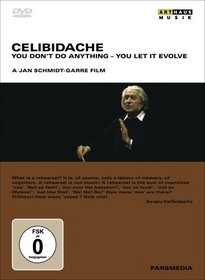| Actor: Sergiu Celibidache Director: Jan Schmidt-Garre Genres: Indie & Art House, Music Video & Concerts, Documentary Sub-Genres: Indie & Art House, Music Video & Concerts, Documentary Studio: Arthaus Musik Format: DVD - Color DVD Release Date: 04/28/2009 Theatrical Release Date: 01/01/1992 Release Year: 2009 Run Time: 1hr 40min Screens: Color Number of Discs: 1 SwapaDVD Credits: 1 Total Copies: 0 Members Wishing: 0 MPAA Rating: NR (Not Rated) Languages: German Subtitles: Italian, German, English, French, Spanish |
Search - Celibidache: You Don't Do Anything, You Let It Evolve on DVD
  | Celibidache You Don't Do Anything You Let It Evolve Actor: Sergiu Celibidache Director: Jan Schmidt-Garre Genres: Indie & Art House, Music Video & Concerts, Documentary NR 2009 1hr 40min |
Larger Image |
Movie Details
We're sorry, our database doesn't have DVD description information for this item. Click here to check Amazon's database -- you can return to this page by closing the new browser tab/window if you want to obtain the DVD from SwapaDVD.
Click here to submit a DVD description for approval.
Similar Movies
|
Movie ReviewsReference for music lovers and Celibidache's (future) fans, fCh | GMT-5, USA | 05/26/2009 (5 out of 5 stars) "Being the happy owner/re-viewer of the great Celibidache, I came to this film with a certain amount of apprehension. Indeed, considering the bounty of music&wisdom of the former owed something to the conductor's son, as director of that production, I had thought another film on the subject could not even come close. If you happen to share such concerns, lay them to rest. This film does not follow as tight a narrative as the other, being a mosaic of smaller pieces (some published before), yet it is enlightening enough to become of reference for music lovers and Celibidache's (future) fans, alike.
The late Romanian conductor Celibidache does a superb job at revealing several elements of truth about music and its philosophy, through the inspired film of Jan Schmidt-Garre. For those familiar with Celibidache's views, music and music making are being approached through the lenses of eastern philosophy and phenomenology. Accordingly, music has to end where it begins, and truth in music cannot be explained, but experienced. Music happens at the intersection of sound and one's inner experience. The composer has to start with an experience, which he transposes into notes, whereas the interprets start with the notes and then strive to re-create the (composer's) experience. Technique, as such, is assumed and subsumed to the more generous goal of turning sound into music. A similar perspective on technique is shared by Nadia Boulanger. As elements of Celibiadache's technique of conducting, I gathered from this film (and reading this book:Conversations With Nadia Boulanger) that the good musician reads the score until its theme(s) emerges, and then each instrument comes and goes only to support the particular musical line. Several instances illustrate this point throughout the film. For example, in Bruckner's Mass in F minor, Celibidache makes a whole orchestra segment go pianissimo so that the flute, and a theme, can be heard. Obviously, Bruckner made no such suggestion/requirement in the score. So, based on this film, a partial checklist of Celibidache's technique may read like this: a) One aims to understand the context round the musical text at the time it was composed; b) One reads the score until the whole emerges, with all its supporting theme(s); c) Finally, one works with the orchestra, going through a thousand NOs to reach that single/final YES, when the end reaches the beginning and sound turns into music. If familiar at all with Celibidache's critics (too slow tempi, etc.), you'll find an interesting story about Celibidache's learning from Furtwangler how to pace oneself through a piece of music, neither fast nor slow, just right relative to what the music says. And, if you pay enough attention to how the music comes alive, however shortly on this DVD, you understand that Celibidache had firm musical convictions pegged to high musical standards, a musical personality no creator should apologize for, and results to match. To me, he could turn an orchestra into an instrument, or small chamber ensemble. These supreme musical achievements are hard to miss, unless too small unit of analysis, or a certain amount of malevolence, were to be employed. As the cost of this DVD is rather high, one would have expected higher quality of the video transfer--the original is obviously some tape(s) that lost its lustre." |

![Sergiu Celibidache in Rehearsal & Performance [DVD Video]](https://nationalbookswap.com/dvd/s/29/9629/159629.jpg)



